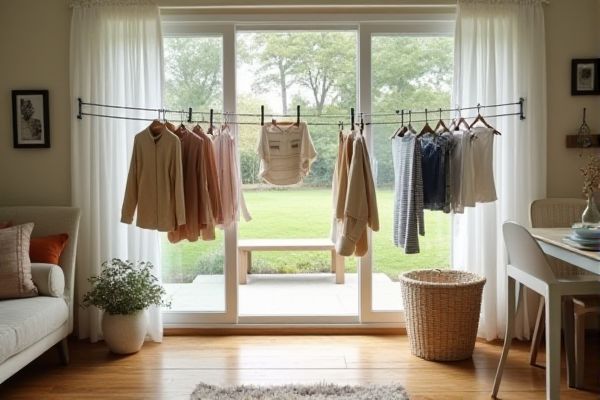
A drip-dry rod offers a fixed, sturdy solution ideal for small spaces and quick drying, while a retractable clothesline provides flexibility and can be neatly stored when not in use, saving space. Discover which option best suits Your laundry needs and living environment by exploring the detailed comparison in the rest of this article.
Table of Comparison
| Feature | Drip-Dry Rod | Retractable Clothesline |
|---|---|---|
| Installation | Wall-mounted or ceiling fixed | Wall-mounted, easy to retract |
| Space Efficiency | Fixed length, occupies permanent space | Retracts when not in use, saves space |
| Capacity | Limited hanging area, typically single rod | Multiple lines extendable, higher drying capacity |
| Durability | Usually made of metal or plastic, sturdy | String or wire lines, depends on material quality |
| Weather Resistance | Good for indoor or covered areas | Suitable for indoor and outdoor use, retracts in bad weather |
| Cost | Generally low to moderate cost | Moderate to higher cost due to mechanism |
| Maintenance | Minimal, occasional cleaning | Requires upkeep of retracting mechanism |
Introduction to Drip-Dry Rods and Retractable Clotheslines
Drip-dry rods provide a fixed, sturdy solution for hanging wet clothes, allowing water to drip directly into a sink or tub, ideal for small spaces and indoor laundry needs. Retractable clotheslines offer flexible, space-saving convenience by extending when needed and retracting out of sight, perfect for outdoor use or limited wall space. Your choice between these drying options depends on available space, drying efficiency, and installation preferences.
Design and Functionality Comparison
Drip-dry rods offer a sturdy, fixed design ideal for hanging heavy garments or multiple items simultaneously, ensuring efficient water drainage and air circulation. Retractable clotheslines provide versatile, space-saving functionality with adjustable lengths, perfect for compact areas or varying laundry loads. Your choice depends on whether you prioritize permanent installation for bulk drying or flexible setup for occasional use.
Installation Process: Ease and Flexibility
The drip-dry rod offers a straightforward installation process, typically requiring wall brackets and minimal tools, making it ideal for quick setup and fixed placement. In contrast, retractable clotheslines provide enhanced flexibility, as they can be extended when needed and retracted to save space, with installation options for both indoor and outdoor use involving wall-mounted or ceiling brackets. Both options cater to different needs, but retractable clotheslines excel in adaptability and space efficiency compared to the more permanent drip-dry rod setup.
Space Requirements and Adaptability
A drip-dry rod requires minimal space and is ideal for small balconies or narrow areas, making it suitable for compact living environments. Retractable clotheslines offer versatile adaptability by extending to accommodate larger loads and retracting when not in use, saving space and maintaining a tidy appearance. Both options enhance drying efficiency, but retractable lines provide greater flexibility for varying space constraints.
Durability and Material Quality
Drip-dry rods are typically made from heavy-duty stainless steel or aluminum, offering superior corrosion resistance and long-lasting durability in outdoor conditions. Retractable clotheslines often use durable nylon or polyester cords with plastic housings, which can wear out or break over time under constant tension and exposure to sunlight. The solid metal construction of drip-dry rods generally ensures greater material longevity compared to the more flexible but less robust retractable clothesline systems.
Cost Effectiveness and Maintenance
A drip-dry rod offers a low-cost, minimal-maintenance solution ideal for small spaces or temporary drying needs. Retractable clotheslines involve a higher initial investment but provide long-term durability and convenience, reducing wear and tear by retracting when not in use. Both options save on energy costs compared to electric dryers, though maintenance for retractable lines includes occasional cleaning and tension adjustments.
Load Capacity and Suitability for Different Fabrics
Drip-dry rods typically offer higher load capacities, making them suitable for heavier fabrics such as towels and blankets. Retractable clotheslines vary in load capacity but generally support lighter garments like shirts or delicates, preventing fabric distortion. Choosing between the two depends on fabric weight and drying needs, with drip-dry rods favored for durability and retractable lines for space-saving and gentle handling.
Indoor vs Outdoor Usability
A drip-dry rod is ideal for indoor use, providing a sturdy, moisture-resistant option for drying clothes without needing much space. Retractable clotheslines excel in outdoor settings, offering flexibility to extend and retract the line as needed, allowing you to maximize airflow and sunlight for faster drying. Your choice depends on where you primarily plan to dry clothes and the convenience you seek in adjusting drying space.
Aesthetic Considerations and Home Décor Impact
Drip-dry rods offer a minimalist and unobtrusive design, blending seamlessly with a variety of interior styles and maintaining a clean, streamlined appearance. Retractable clotheslines provide flexibility by staying hidden when not in use, preserving wall space and contributing to a clutter-free environment. Both options enhance home decor by minimizing visual disruption, but retractable clotheslines excel in maintaining aesthetic harmony through their discreet storage feature.
Choosing the Best Option for Your Laundry Needs
Drip-dry rods provide a sturdy and space-saving solution ideal for small balconies or laundry rooms, allowing clothes to hang freely and dry efficiently. Retractable clotheslines offer versatility and convenience with adjustable lengths, perfect for varying laundry loads and easy storage when not in use. Selecting the best option depends on available space, drying capacity, and ease of installation tailored to your household's drying routine.
 homyna.com
homyna.com